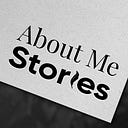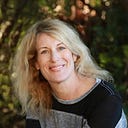About Me — Debbie Weiss
Offering Empathy to Those who Find Themselves Alone at Middle Age
Why I Write
I started writing essays in 2013 after my husband George died of cancer. I needed to know I still existed after a year of being his caregiver, watching him disintegrate, feeling deep in my bones that somehow I was failing him. He was in denial so he thought he was going to recover even as his body abandoned him.
I couldn't fix his illness, not could I jolt him into reality, nor get him to agree to palliative care, nor to involve his parents who were going to lose their only child. I thought I was crawling out of my skin. Through grief therapy, I found out I had post-traumatic stress disorder.
Over the next few years, I sort of got better, in dribs and drabs, but the loneliness enveloped me. For 32 years, George and I had eaten dinner together almost every night, then curled up in bed to wake up beside each other each morning. I still wonder, where does all that love go? Is it transmuted into protective energy or is it just gone?
The Hungover Widow
I started my blog, The Hungover Widow — so named for my excessive Manhattan consumption back then — as my confessional. I started out wanting to learn from my mistakes, but now, I’m offering empathy to those who find themselves alone at middle age.
In different publications, I’ve written about caregiver guilt, living alone for the first time at age fifty, surviving the holidays as a widow, exploring sexuality as a widow, and escaping an emotionally abusive relationship. I’ve heard that sharing our foibles with others helps to cleanse our shame over them, and it has helped me.
My second best writing moment was having an essay about dating a polyamorous tantric sex instructor published in The New York Times’ “Modern Love” column. My first best moment was teaching an essay writing class as a result of that column. My worst moment was writing a full manuscript, trying to get it published and…nothing. Being a writer sometimes feels like trying to peddle rancid fish.
Before being widowed, I couldn’t understand how someone could be with an unkind partner, or cheat in a relationship, or otherwise tolerate being demeaned. Now, I understood the depths to which can fall so as not to be alone. And that sharing our stories can help us to feel less alienated after a loss.
So many of us are mourning something, be it a person, a way of life, or even our childhoods. I wish we treated grief as a permanent part of our mental state instead of a glitch to be worked through as quickly as possible.
My mother died in 1973 when I was ten. Back then, when a child lost a parent, the prescribed treatment was to carry on as if nothing had happened if the kid appeared to be functioning properly. When I lost George, I wanted to talk about it. But forty years after losing my mom, I found that people still glossed over grief.
“But you’re doing better now,” I’d hear from acquaintances who just wanted to change the topic. But how do you eradicate thirty-two years of your life from your conversation?
I’m basically an unemployed slacker.
I graduated from U.C. Davis law school in 1988 at twenty-four and practiced insurance coverage law for eleven years. We coverage lawyers are known as “geeks” because we use research and writing to interpret insurance policies. It’s about as exciting as it sounds.
In retrospect, I wanted to prove that I could succeed at something after being the girl who couldn’t finish her homework after her mother died. I quit practicing law at forty because I hated working in an adversarial environment, and I never returned. Back then, George was my life.
Last year, I earned a Master of Fine Arts in Creative Nonfiction from Saint Mary’s College of California. After some truly disappointing relationships, I met my second unicorn on OK Cupid. We’ve been together two and a half years.
I want to offer hope that life can get better after a devastating loss. It just takes waaaay longer than you think it will, and it might not look the way you expected.
My Articles
Lately, I’ve been obsessing over the adversarial nature of middle aged dating. Why do we give up on love just because we’re older? And why do so many older, single men and women seem so leery of each other? To that end, here are some of my essays on Medium:
Disillusionment: It’s What’s Killing Middle-Aged Dating
The Biggest Problem with Middle-Aged Dating? Living in the Past.
Five Lessons I Learned from My First Date in 32 Years
Contact Me
My blog The Hungover Widow has lots of posts for widowed people, including dating after widowhood, holding space for grief, competitive widowing, and the stigma of loneliness. You can contact me there and I love hearing from folks.
Twitter: DkweissWeiss
LinkedIn: Debbie Weiss

